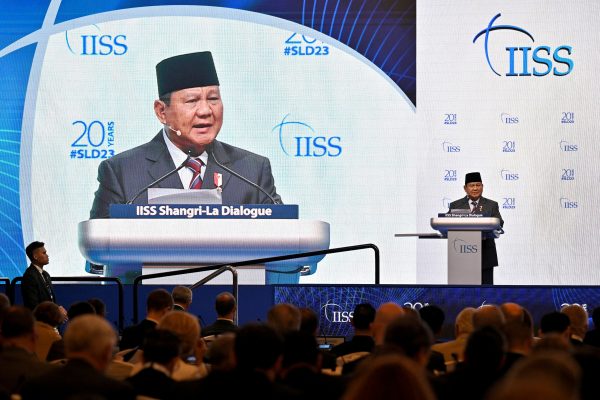Yet it’s become the worst-kept secret in Jakarta that the President increasingly sees advantage in having his defence minister, Prabowo Subianto, succeed him in 2024.
The aura of being Jokowi’s favoured successor matters because he approaches his last year in office with his approval ratings just above 80 per cent, an all-time high. Benign economic conditions have helped a lot. Indonesia’s GDP grew by 5.2 per cent from July 2022 to July 2023, with inflation at just 3 per cent over the same period. Corruption, informality and inequality still weigh on Indonesia’s economic potential, but for the average voter, the Widodo-era economy has expanded economic opportunities, increased availability of cash transfers and subsidised health care.
Prabowo now polls just ahead of Central Java governor Ganjar Pranowo in a three-way race that includes the opposition’s candidate, former Jakarta governor Anies Baswedan, who’s failed to gain traction. Ganjar, a member of the nationalist PDI-P party like Widodo, is burdened by his close association with PDI-P chair and former president Megawati Soekarnoputri, an electorally polarising figure with whom Jokowi has a tense relationship. Prabowo remains the fallback option for voters who now prefer Anies. Polls predict that he would win if Anies fails to make it onto the ballot and would prevail in a June runoff should Anies be eliminated in the first round of voting in February.
Jokowi is unlikely to risk alienating any political faction by making an outright endorsement ahead of the election. Yet he is said to be concerned by extensive concessions Ganjar has made to Megawati about the choice of his running mate and his future cabinet. Prabowo has meanwhile chosen to consult Jokowi closely on election strategy and promise policy continuity, and has been rewarded with a steady tempo of photo ops and media leaks meant to project a chummy relationship with the popular president.
While the election remains competitive, Prabowo is in a strong position to gain the presidency he has long coveted — and if he wins, Indonesia is set for a reckoning with the legacies of its authoritarian past and the frailties of its contemporary democracy.
A former army general, Prabowo gained notoriety as a diehard defender of his then father-in-law Suharto’s dictatorship as it disintegrated amid the Asian Financial Crisis. Since his reinvention as a party politician, he and his Gerindra party have made little attempt to disguise their disdain for what they call the excessive ‘liberalism’ of the post-reformasi system.
However, voters generally don’t share progressive civil society’s horror at the thought of Prabowo holding presidential power — least of all the increasing share of the electorate too young to remember the Suharto years. Indonesia’s electoral commission estimates that just over half of the 2024 electorate will be aged under 40. Though at 71 he’s 17 years older than Ganjar Pranowo and nine years older than Jokowi, Prabowo polls especially well among Gen-Z and millennial voters, who are attracted to his maverick style and unabashed nationalism.
Whatever lies in store for the democratic system if Prabowo wins, the broad guiderails are in place for overall policy continuity post-2024. Jokowi sees his policies of forced ‘downstreaming’ of industries, by banning the export of raw materials to incentivise investment in processing, as a key legacy item alongside his plans for a new capital city, Nusantara.
Indonesia’s capital might, on paper at least, move from Jakarta to the east coast of Borneo. But the development of the city will probably stall once the immense cost of the project becomes too hard to defend. Downstreaming, however, may be here to stay, as the policy has come to be viewed as instrumental in Indonesia’s emergence as a production base for electric vehicles and their components, as well as products like stainless steel.
Technocrats and investors will have a hard time convincing the next government that there are more efficient ways for Indonesia to get greater economic value from its huge mineral resource endowments and attract investment in manufacturing. Ganjar’s PDI-P remains influenced by the autarkic fantasies of the Sukarno era, and a key part of Prabowo’s political stock in trade is the idea that Indonesia’s national wealth is being siphoned off by foreigners.
Despite the crucial importance of economic matters in the political outlook of voters, there will be little fundamental contestation of economic policy in the 2024 campaign.
Ironically, in one area that has almost zero electoral relevance — foreign affairs — there are some key differences between the two strongest candidates. Ganjar is a foreign policy neophyte, having built his political career on the bread-and-butter issues of local politics. Like Jokowi, he’d likely leave it to technocrats to manage a cautious and an economics-based foreign policy agenda until he got a feel for the issues.
Prabowo is a vastly more globally-minded politician who would likely seek a hands-on role in his foreign policy. This could be a double-edged sword, depending on how much Prabowo believes in the paranoid nationalist tropes that have figured heavily in his political rhetoric over the years.
Prabowo has long been fond of quoting Thucydides on how ‘the strong do what they can and the weak suffer what they must’. Only after the election would we find out if this is the basis of a commitment to building a multilateral system that can protect the interests of the ‘weak’, or a realist’s lament that Indonesia lacks the economic and military power to count among the ‘strong’.
Liam Gammon is Research Fellow in the East Asian Bureau of Economic Research at the Australian National University.

